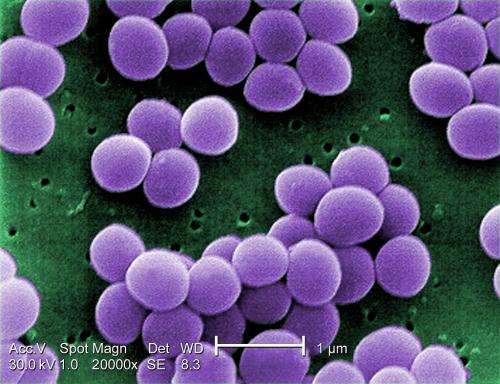New material inhibits bacteria without penicillin

The mesoporous material Upsalite is shown to inhibit growth of bacteria associated with acne and hospital acquired infections. In a study published in ACS Omega, researchers at Uppsala University have shown that the mesoporous magnesium carbonate Upsalite exerts strong bacteriostatic effect on Staphylococcus epidermidis.
Staphylococcus epidermidis is an opportunistic bacterium that has received the most attention for causing hospital acquired infections (HAIs), and can readily become resistant to antibiotics. It is also associated with acne as well as infections of intravascular devices and complications in patients with implanted prosthetic material. The results open up for development of materials inhibiting bacterial growth without the use of antibiotics for e.g. dermal applications.
Porous materials are abundant in nature; wood, rocks and cancellous bone are some examples of such materials. In recent years, researchers have shown increased attention to porous materials, especially mesoporous materials where the pores are between 2 and 50 nanometers in diameter. Today such materials are developed for applications including delivery of medicines, moisture adsorption and wastewater cleaning. For many of these applications it is of importance to know how the materials affect biological entities such as different cells and bacteria.
Upsalite is a mesoporous magnesium carbonate discovered in 2013 by researchers at Uppsala University. The material has previously been shown to be skin-friendly, and to be a promising excipient for formulation of poorly soluble drugs.
In a just published article, in the journal ACS Omega, researchers at Uppsala University show that Upsalite exerts strong bacteriostatic effect on Staphylococcus epidermidis. This open up new possibilities for Upsalite, especially in certain dermal applications where an inhibition of bacterial growth is desirable.
"These newly found bacteriostatic properties combined with the ability to load and release molecules, for example fragrances from the pores in the material are highly interesting for many applications," says Maria Strømme, Professor at Department of Engineering Sciences, Nano Technology and Functional Materials one of the authors behind the study.
More information: Ken Welch et al. Investigation of the Antibacterial Effect of Mesoporous Magnesium Carbonate, ACS Omega (2016). DOI: 10.1021/acsomega.6b00124
Provided by Uppsala University





















